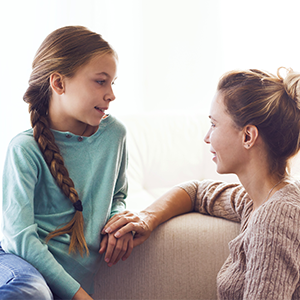As the coronavirus pandemic unfolds, we know that there will be many deaths
in our communities. Unfortunately, it is likely that there may be one or
more deaths that impact the lives of our children. While it may be
difficult to face this fact, it makes sense to be prepared to help our
children through these difficult times ahead.
Find Teachable Moments
Children develop healthy, appropriate responses to death when parents are
honest about death. When your preschooler asks about the dead squirrel in
the street that was hit by a car, speak honestly. If your child comes
across a dead bird, explain that it is dead. Tell her that the bird cannot
breathe or move or eat anymore, like it did when it was alive. Share that
when animals die, room is made for new living creatures. If a pet goldfish
dies, rather than replace it in hopes that your child does not notice,
allow her to experience the loss. Trust that although she may be sad, she
is also resilient.
Use Clear, Simple Terms
Our society is uncomfortable with death. We have many euphemisms for it.
When speaking with young children, avoid saying things like, “Grandpa went
to sleep,” as that could make children fearful of sleep or “We lost
Grandpa,” as the word “loss” may confuse a young child who understands
things literally. Use terms like “die” and “death.” While these words may
sound harsh, they are appropriate for our children’s developmental stage.
Similarly, saying “Grandma had a heart attack” might lead a child to think
someone “attacked” Grandma’s heart. If you are not sure your child
understands the medical terms you use, ask her to explain what your words
mean. If she cannot, then try simpler terms.
Involve Your Child
If a neighbor dies, invite your child to help make a meal for the family.
If a pet frog dies, invite her to create a ritual. She might decorate a box
for the frog to be placed in before it is buried. If a family member dies,
given these days of social distancing, it is unlikely that large funeral
gatherings will be allowed. If a ceremony or celebration is happening
online, invite your child to attend. If she does not want to attend or if
she wishes to leave early, let that be OK. Never force a child to attend if
she does not want to be there.
Allow the child to create her own traditions, too. She may want to plant
Grandma’s favorite flower or play Grandma’s favorite game. She might want
to bake the cookies Grandma liked. Whatever she chooses to do could become
a way to celebrate future anniversaries of the death.
Make Grieving OK
Adults often hesitate to show children their grief. Susan Wilensky, a
Bereavement Counselor at Montgomery Hospice, notes that one of the best
things parents can do for their children is to deal with their own grief.
She wants parents to know that it is OK for children to see you cry. They
will see that eventually you will also laugh and play. Be sure to talk
about the person who died, even if you cry when you do. That will let your
child know that it is OK to share her own memories of the person, even if
she cries when she does, too. Sharing memories together is healthy and
healing.
Know That Children Grieve Differently
Wilensky notes that adults hold their grief and process it, whereas
children go in and out of their grief more fluidly. Joey might ask about
Grandpa very intensely one moment, and then, in the next, he is off
running, playing and laughing. This is normal for a child and is not reason
for concern.
Also, while many adults like to talk through their grief, children often
work through their grief with projects. Maria may want to decorate a
special box in which to keep items that belonged to her brother, such as
his favorite baseball card, his toy car and a favorite marble. John may
want to make a collage of pictures of himself with his Grandpa.
Get Help for Your Own Grief
Losing a parent, a spouse, a child or another loved one can be
overwhelming. You may not feel that you can be there in the way you would
like to be for your child and her grief. If that is the case, remember to
reach out for help. It’s OK to rely on relatives, friends and neighbors for
support, especially during this time of social distancing. Ask a friend to
read a story online to your child or to play a game. Your child will
experience the support from another adult in her life. Take the time you
need for your own grief. Contact a therapist. Many are offering teletherapy
services. Reach out to one of the 20 organizations in this area that offer
grief support, including the Wendt Center in Washington, D.C., Montgomery
Hospice in Montgomery County and Capital Caring in Northern Virginia.
Resources: Books for Grieving Children (Recommended by Montgomery Hospice)
- “When Dinosaurs Die” by Laurene Krasny Brown & Marc Brown
- “Double-Dip Feelings: Stories to Help Children Understand Emotions” by
Barbara S. Cain - “My Grandpa Died Today” by Joan Fassler
- “Poppy’s Chair” by Karen Hesse
- “A Terrible Thing Happened” by Margaret M. Holmes
- “When Someone Dies” by Sharon Greenlee
- “When My Mommy Died” and “When My Daddy Died” by Janice M. Hammond
- “Annie and the Old One” by Miska Miles
- “Don’t Despair on Thursdays” by Adolph Moser
- “The Saddest Time” by Norma Simon
- “Badger’s Parting Gifts” by Sunsa Varley
- “The Tenth Good Thing about Barney” by Judith Viorst
*This article has been adapted from an earlier article that appeared in Washington Parent magazine in May 2017.

